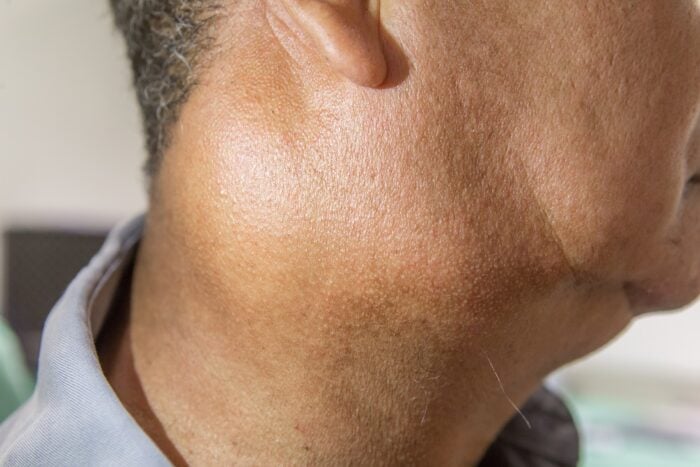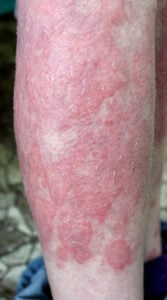Old Wisdom and New Advancements in Lymphoma Treatment
4 min read

A conversation with Rocky Mountain Cancer Centers’ Dr. John Burke
What is Lymphoma?
Lymphoma is a cancer of lymphocytes, which are a subset of white blood cells that help fight certain infections. “What happens when a lymphocyte turns into cancer,” says Dr. Burke, “is that there are basically abnormalities in the cell machinery.”
Cancerous lymphocytes don’t die the way normal cells do. They also replicate faster – and those replications are all cancerous copies of the cell. Therefore, cancerous lymphocytes accumulate in the body, leading to the symptoms of lymphoma.
Lymphoma often leads to swelling of the lymph nodes. However, lymphomas can also involve organs, including the brain, lung, kidney, testis, bones, and skin. Some patients have symptoms called “B symptoms,” meaning fevers, drenching sweats, or significant weight loss. But not all patients have B symptoms.
Lymphoma is broadly separated into two types:
- Hodgkin lymphoma (Hodgkin’s lymphoma or HL)
- Non-Hodgkin lymphoma (Non-Hodgkin’s lymphoma or NHL)
Within each type of lymphoma, there are various subtypes, as well. Lymphoma is a disease that defies broad generalities.
“Not every type of lymphoma is the same,” says Dr. Burke. “Some can be fast-growing, some slow-growing. These different types of lymphoma can have a different prognosis and different course of treatment.”
For those of us not in the medical profession, there are several things about lymphoma that differ from the understanding of cancer that we’ve acquired through general informative sources.
Lymphoma is different from other types of cancer
For starters, there is very little that people can do in terms of cancer prevention for lymphoma. Additionally, often there aren’t obvious signs or symptoms of lymphoma. There are no screening tests – like mammograms for breast cancer or colonoscopies for colon cancer – that are recommended. However, Dr. Burke advises people with more than one of the following symptoms to consult with their physician:

- Painless swelling of lymph nodes in your neck, armpits or groin
- Unexplained fatigue
- Fever without an obvious reason (i.e., viral infection)
- Night sweats
- Shortness of breath
- Unexplained weight loss
- Itchy skin
Treatment for lymphoma
Surgery has little role in the management of lymphomas, other than to perform biopsies to make the diagnosis. Instead, chemotherapy, immunotherapy, and radiation therapy are the mainstays of initial treatment for lymphomas. Bone marrow, blood marrow, and stem cell transplantation are sometimes used, as well. Lymphoma doctors will make treatment recommendations based on factors such as the type of lymphoma, its stage, how fast it’s growing, the patient’s medical history and other health problems, and patient preference.
However, another way that lymphoma differs from other types of cancer is that slow-growing forms, called indolent lymphomas, may not even be treated when first diagnosed. That is, patients with advanced-stage indolent lymphomas that are widespread throughout the body but not causing symptoms may first be managed with a course of “watchful waiting” as opposed to immediate treatment.
“Sometimes people are surprised,” Dr. Burke says. “They say: ‘you’ve just told me I have cancer, but you’re not going to treat it?’ But some of these indolent lymphomas, although treatable, are not curable. And studies have shown that patients may do just as well if they delay treatment until the disease is causing them problems. In fact, a subset of patients never develops any problems from indolent lymphomas. So sometimes we spare the patient some of the negative effects of treatment.”
Some patients can be in a phase of “watchful waiting” for a decade or more, Dr. Burke says.
Though “waiting” connotes a lack of action, the “watchful” element is the important part of the scenario. This is not the same as ignoring a medical problem in the hopes that it will go away. Some forms of “aggressive” lymphomas, which grow more quickly than indolent lymphomas, require immediate treatment.

There are many new advancements in lymphoma treatment that are cause for optimism. Dr. Burke is already putting some of those advancements into practice at RMCC. One example of this is an antibody treatment that targets a protein on the surface of the lymphoma cells. Another is called an antibody-drug conjugate, that delivers a chemotherapy drug directly into the lymphoma cell, while trying to spare the surrounding normal cells. Other new therapies like CAR T-cell therapies are being offered at specialized centers.
Additionally, Dr. Burke points to some promising study results presented at the recent meeting of the American Society of Hematology (ASH) for patients with relapsed Hodgkin lymphoma and indolent lymphomas. Newer treatments appear to be more effective and more tolerable. Several new targeted drugs have also received FDA approval recently for treatment of lymphoma, including CAR T-cell therapy for follicular lymphoma.
Find more lymphoma information here. If you’ve been diagnosed with lymphoma, schedule an appointment with a lymphoma specialist at RMCC.
